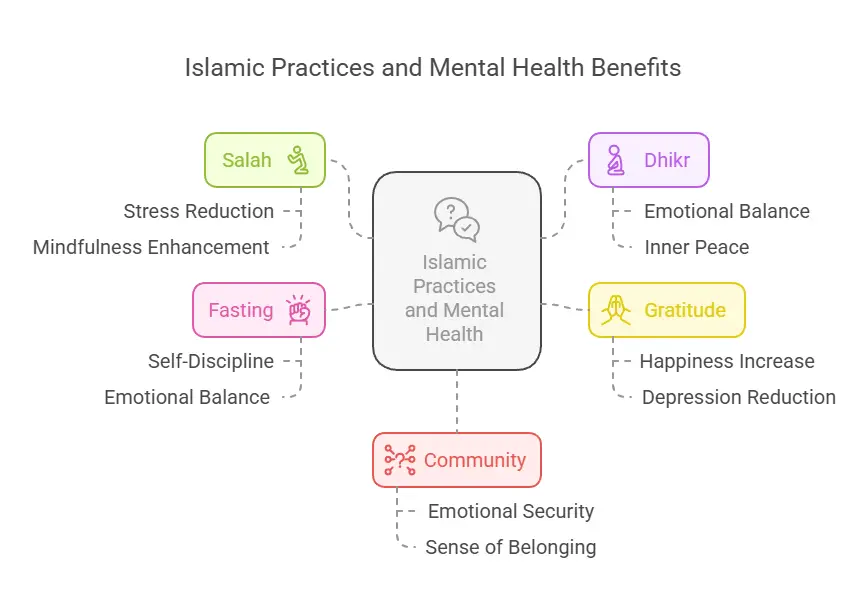
With mental health being a focus for many, this makes mental well-being in the current dynamic world a top issue.
Islam is not only a spiritual faith for Muslims but also a way of life which means they can practice the teachings that promote mental health and emotional balance.
The Islam practices are timeless tools for managing stress, anxiety, and depression – from the practice of Salah to the remembrance of Allah through Dhikr.
This article looks at 5 Islamic habits for mental well-being, examining their psychological aspects and presenting insights on how to apply them to your life.
The Habits discussed here are not just for the religious or spiritual seekers – they are for anyone who is struggling to find inner peace, emotional stability, or a deeper connection with their faith, these habits can guide you toward a more balanced and fulfilling life.
In this article, how Islam’s wisdom can lift your mental health journey will be analyzed in detail through this article.
1. Salah (Prayer): A Pillar of Mental Peace
Prayer is the most significant in value of the humble and a must do for each Muslim.
Beside its spiritual purpose, Salah is very useful psychologically.
According to the data of the research, those who pray every day can decrease their stress and anxiety by being more mindful and fulfilled.
When do you stand before Allah, you may leave all the hustle and bustle of your life, thus you create a mental time to think and feel peace.
Practical Tips:
- Set a consistent prayer schedule to build routine.
- Focus on the meanings of the verses (Tadabbur) to enhance mindfulness.
- Use Salah as a moment to release your worries and seek solace.
Example: A study published in the Journal of Religion and Health found that individuals who engage in regular prayer experience lower levels of cortisol, the stress hormone. This highlights the tangible mental health benefits of Salah.
2. Dhikr (Remembrance of Allah): A Tool for Emotional Stability
Dhikr is the remembrance activity of Almighty Allah. It has been a technique of behavioral modification that yields a peaceful mind.
Furthermore, saying SubhanAllah (Glory be to Allah) and Alhamdulillah (all the praise belongs to Allah) aloud, promotes the feeling of appreciation and inner peace.
Dhikr can be mini-meditation, it helps to regain peace of soul and to get rid of negativity in the mind.
Types of Dhikr:
- Tasbih (Glory to Allah) for mindfulness.
- Istighfar (Seeking forgiveness) for emotional release.
- Salawat (Blessings on the Prophet) for spiritual connection.
Example: The Prophet Muhammad (PBUH) said,
The comparison of the one who remembers Allah and the one who does not is like that of the living and the dead” (Sahih Bukhari).
This Hadith underscores the life-giving power of Dhikr.
3. Gratitude (Shukr): Cultivating a Positive Mindset
Islam has greatly asserted its concept of gratitude as strongly iterated in the Quran and Hadith.
Practicing Shukr does shift the mind from the lack of something to being grateful for many blessings leading to positivity.
The research indicates that gratitude can also produce a reconfiguration of the brain, which leads to a heightened experience of happiness and a fall in depressive symptoms.
Practical Ways to Practice Shukr:
- Keep a gratitude journal, listing three things you’re thankful for daily.
- Verbally express gratitude to others, strengthening social bonds.
- Reflect on Allah’s blessings during moments of difficulty.
Example: The Quran states, “If you are grateful, I will surely increase you [in favor]” (Surah Ibrahim, 14:7).
This verse highlights the reciprocal nature of gratitude in Islam.
Fasting (Sawm): A Path to Self-Discipline and Emotional Balance
Fasting during the holy month of Ramadan is not only a physical act but rather, a mental and spiritual exercise as well.
It teaches people self-discipline, patience, and empathy, which in turn, contribute to the emotional balance.
In addition, by fasting we clear the clutter of our minds, which subsequently allows us to get rid of previous negative or unhealthy patterns of thought.
Tips for Fasting and Mental Well-Being:
- Use fasting as an opportunity to reflect on your life and goals.
- Stay hydrated and eat nutritious meals during non-fasting hours.
- Engage in acts of charity and kindness to enhance the spiritual experience.
Example: A study by the University of Cambridge found that fasting can improve brain function and reduce symptoms of anxiety and depression.
Community and Brotherhood (Ummah): The Power of Social Connection
Islam places great emphasis on community and brotherhood. Being part of a supportive Ummah provides emotional security and a sense of belonging. Regular participation in Islamic gatherings, such as Jummah prayers or study circles, fosters social connections that are vital for mental health.
Building Strong Relationships:
- Volunteer for community service projects.
- Attend Islamic events and lectures to meet like-minded individuals.
- Offer support to those in need, reinforcing the value of compassion.
Example: The Prophet Muhammad (PBUH) said, “The believers in their mutual kindness, compassion, and sympathy are just like one body. When one of the limbs suffers, the whole body responds to it with wakefulness and fever” (Sahih Bukhari).
Conclusion
By adopting the given techniques, relatively a person’s mental well-being can be achieved from a new perspective turning your life around.
Islam’s approach to mental health is all-encompassing, with everything from the prayerfulness of Salah to the stability provided by Dhikr, thus making it a total experience of inner peace and happiness.
Start with something simple, which you can be consistent with, and never forget that mental well-being is a journey that lasts the whole of your life.
Begin a dialogue by talking about personal stories with these habits and encourage others to be strong in their faith.
Through our cooperation, we will make a healthier and more balanced Ummah where the Ummahicans are both the caregivers and the caregiversrel.
FAQs
- How does Salah help with anxiety?
Salah promotes mindfulness and provides a structured routine, reducing feelings of anxiety. - What are the best Dhikr phrases for stress relief?
SubhanAllah, Alhamdulillah, and La ilaha illallah are highly effective. - Can fasting improve mental clarity?
Yes, fasting detoxifies the mind and enhances focus. - How can I practice gratitude in Islam?
Keep a gratitude journal and reflect on Allah’s blessings daily. - Why is community important for mental health in Islam?
A supportive community provides emotional security and reduces feelings of isolation.




